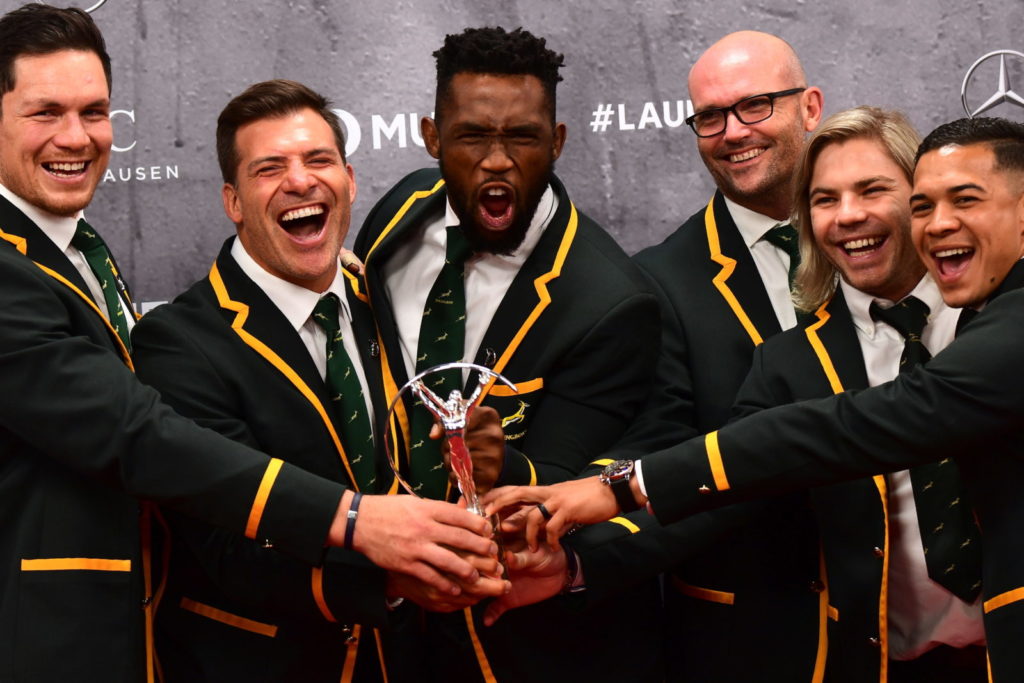The World Cup-winning Springboks continue to embrace their responsibility as agents of change, writes JON CARDINELLI.
Siya Kolisi was greeted warmly by the global media contingent when he entered the media conference room after the World Cup final in Yokohama. The applause level spiked appreciably after he placed the Webb Ellis Cup at the centre of the top table and then paused for effect.
Hundreds of reporters quietened down, though, when Rassie Erasmus delivered a rousing speech about unity and what the team’s achievement could mean for South Africa as a whole.
‘It’s not the Springboks’ responsibility to bring the people of South Africa hope. It is our privilege,’ he said.
Erasmus choked up when he spoke about Kolisi’s incredible journey from a township in Zwide to the World Cup-winners podium in Yokohama. He gave the impression that the 2019 season marked the start of a new and prosperous chapter for South African rugby.
Thousands of South African fans took to the streets when the Boks toured Gauteng, Durban, the Eastern Cape and Cape Town the following week. Speaking outside Cape Town City Hall, Kolisi instructed those in the crowd to look around and acknowledge how people from different races and backgrounds can be united in a common purpose.
SIYA KOLISI: ‘With one main goal, we came together’
Former president Nelson Mandela said that sport has the power to unite in a way that little else does. Last November, we saw Mandela’s words in action. We saw people from all walks of life coming together to celebrate the Boks – or rather the most diverse South African team in history – and ultimately a unique World Cup victory.
On Monday, we saw Kolisi standing in front of the sporting world and explaining how a diverse group of players managed to triumph against the odds.
After Kolisi accepted the prestigious Laureus Team of the Year award, he spoke about inspiring the next generation of South African players – whether they are from the townships in the Eastern Cape or from the farms on the platteland or even from the more affluent suburbs in the big cities – to work together and give this troubled nation a reason to smile.
Erasmus, Kolisi and the entire class of 2019 have left an indelible mark on the South African game. In fact, I wouldn’t be surprised if people around the world drew inspiration from this Springbok story in years to come.
WATCH: ‘We really touch lives the way governments cannot’
The Japanese embraced the Boks wholeheartedly over the course of the 2019 World Cup tournament. Even in the lead-up to the quarter-final showdown between the hosts and the Boks – a first playoff appearance for the tier-two rugby nation – there was a healthy respect for the South Africans.
The fans waited patiently outside the team’s training venues and hotels for autographs. The local reporters addressed the coach as ‘Rassie-san’ when they attended media conferences in their droves.
The media from Europe was also taken by what the Boks had achieved under Erasmus and the nation’s first black captain. By the time the final against England rolled around, many were drawing comparisons between the class of 2019 and the trailblazers of 1995.
Who could have predicted that a team ranked seventh on the World Rugby ladder would claim the sport’s biggest prize only two years later? It will go down as one of the great comeback stories.
The real story of course – and the one that’s most relevant in the South African context – is how players and coaches from different walks of life embraced their differences and united to pursue a common goal.
Kolisi reminded the world again on Monday. It’s a lesson that should never ever be forgotten.
Photo: Getty Images





